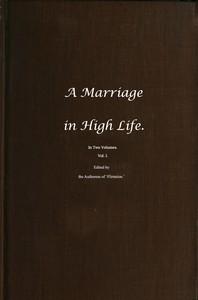|
|
Read this ebook for free! No credit card needed, absolutely nothing to pay.Words: 42624 in 12 pages
This is an ebook sharing website. You can read the uploaded ebooks for free here. No credit cards needed, nothing to pay. If you want to own a digital copy of the ebook, or want to read offline with your favorite ebook-reader, then you can choose to buy and download the ebook.

: A Marriage in High Life Volume II by Scott Lady Caroline Lucy Bury Charlotte Campbell Lady Editor - Great Britain Social life and customs 19th century Fiction; Marriage Fiction@FreeBooksThu 08 Jun, 2023 INTRODUCTION The first sketches for "The Will to Power" were made in 1884, soon after the publication of the first three parts of "Thus Spake Zarathustra," and thereafter, for four years, Nietzsche piled up notes. They were written at all the places he visited on his endless travels in search of health--at Nice, at Venice, at Sils-Maria in the Engadine , at Cannobio, at Z?rich, at Genoa, at Chur, at Leipzig. Several times his work was interrupted by other books, first by "Beyond Good and Evil," then by "The Genealogy of Morals" , then by his Wagner pamphlets. Almost as often he changed his plan. Once he decided to expand "The Will to Power" to ten volumes, with "An Attempt at a New Interpretation of the World" as a general sub-title. Again he adopted the sub-title of "An Interpretation of All That Happens." Finally, he hit upon "An Attempt at a Transvaluation of All Values," and went back to four volumes, though with a number of changes in their arrangement. In September, 1888, he began actual work upon the first volume, and before the end of the month it was completed. The Summer had been one of almost hysterical creative activity. Since the middle of June he had written two other small books, "The Case of Wagner" and "The Twilight of the Idols," and before the end of the year he was destined to write "Ecce Homo." Some time during December his health began to fail rapidly, and soon after the New Year he was helpless. Thereafter he wrote no more. In truth, the present philippic is as necessary to the completeness of the whole of Nietzsche's system as the keystone is to the arch. All the curves of his speculation lead up to it. What he flung himself against, from beginning to end of his days of writing, was always, in the last analysis, Christianity in some form or other--Christianity as a system of practical ethics, Christianity as a political code, Christianity as metaphysics, Christianity as a gauge of the truth. It would be difficult to think of any intellectual enterprise on his long list that did not, more or less directly and clearly, relate itself to this master enterprise of them all. It was as if his apostasy from the faith of his fathers, filling him with the fiery zeal of the convert, and particularly of the convert to heresy, had blinded him to every other element in the gigantic self-delusion of civilized man. The will to power was his answer to Christianity's affectation of humility and self-sacrifice; eternal recurrence was his mocking criticism of Christian optimism and millennialism; the superman was his candidate for the place of the Christian ideal of the "good" man, prudently abased before the throne of God. The things he chiefly argued for were anti-Christian things--the abandonment of the purely moral view of life, the rehabilitation of instinct, the dethronement of weakness and timidity as ideals, the renunciation of the whole hocus-pocus of dogmatic religion, the extermination of false aristocracies , the revival of the healthy, lordly "innocence" that was Greek. If he was anything in a word, Nietzsche was a Greek born two thousand years too late. His dreams were thoroughly Hellenic; his whole manner of thinking was Hellenic; his peculiar errors were Hellenic no less. But his Hellenism, I need not add, was anything but the pale neo-Platonism that has run like a thread through the thinking of the Western world since the days of the Christian Fathers. From Plato, to be sure, he got what all of us must get, but his real forefather was Heraclitus. It is in Heraclitus that one finds the germ of his primary view of the universe--a view, to wit, that sees it, not as moral phenomenon, but as mere aesthetic representation. The God that Nietzsche imagined, in the end, was not far from the God that such an artist as Joseph Conrad imagines--a supreme craftsman, ever experimenting, ever coming closer to an ideal balancing of lines and forces, and yet always failing to work out the final harmony. But under all this alarmed and preposterous tosh there was at least a sound instinct, and that was the instinct which recognized Nietzsche as the most eloquent, pertinacious and effective of all the critics of the philosophy to which the Allies against Germany stood committed, and on the strength of which, at all events in theory, the United States had engaged itself in the war. He was not, in point of fact, involved with the visible enemy, save in remote and transient ways; the German, officially, remained the most ardent of Christians during the war and became a democrat at its close. But he was plainly a foe of democracy in all its forms, political, religious and epistemological, and what is worse, his opposition was set forth in terms that were not only extraordinarily penetrating and devastating, but also uncommonly offensive. It was thus quite natural that he should ersation--for that no one was allowed to go into the room, my lord himself giving him the necessary medicines, and having dismissed the nurse." After her maid had taken off Emmeline's gown, unplaited her hair, and, at her desire, lit the fire in her dressing-room, as she fancied it would be a sort of companion to her, which, in her present state of mind, she felt to be necessary, she sent Jenkins to bed, and, drawing her chair close upon the hearth, Emmeline remained lost in reflections neither cheering nor soothing. The near neighbourhood of a death-bed gives an awful feeling even to one in the full pride of youth and health. To be aware that so close to us a fellow-creature is probably just then passing, through the agonies of death, to that eternity to which we all look with awe, is an overpowering sensation; and Emmeline shuddered as these thoughts crossed her mind. She cast her eyes fearfully round the room, and endeavoured to brighten the flame in the grate. Still death and its horrors hung over her imagination, which wandered now to future scenes of pain and punishment; and the thought that Fitzhenry--her loved Fitzhenry, who had wound himself round every fibre of her heart--might perhaps be an outcast from that heaven to which she had been taught to look, as the end and aim of her existence, was agony. For she could not conceal from herself that he was living in bold defiance, or rather in total disregard and indifference to the will and laws of his God. Emmeline's blood curdled, and a cold shiver crept all over her frame. Instinctively she sunk on her knees, and prayed for him who had never been taught to pray for himself. Her head sank on her clasped hands, which rested on a chair beside her; her long hair falling over her face and shoulders. The dead silence that surrounded her, appalled her awe-stricken mind; she eagerly listened for some sound of human existence and neighbourhood; but nothing was to be heard but the regular vibration of the great clock in the hall. Emmeline remained kneeling, till her nervous agitation grew so painfully strong, that she hardly dared to move, and had not power to shake off the superstitious horror which had taken possession of her. Every limb trembled; the cold sweat stood on her forehead; and it was an inexpressible relief to her disordered mind, when, at length, she heard a slow step in the gallery, and a gentle knock at her door. She concluded it was her maid, bringing her some tidings of Reynolds, and she quickly and joyfully bade her enter. The door softly opened, and Fitzhenry appeared. An unearthly vision could scarcely have startled Emmeline more. She uttered an exclamation, almost of terror, as she hastily rose from her knees; but almost directly sank into the chair beside her, her trembling limbs refusing to support her. "I think you gave me leave to come in," said Fitzhenry, still standing at the door. Emmeline bowed assent, when, closing it after him, he came up to her, and put his candle on the mantle-piece. "I thought you would be anxious to hear about poor Reynolds; and as he has now sunk into something like sleep, I came away for a minute to tell you he is more easy and composed; but I fear this stupor is only the forerunner of death, and that all will soon be over. I shall lose a most faithful servant--indeed, an attached friend--." He paused; but Emmeline, still too nervous to speak, said nothing. "I also came," said he, in an agitated, hurried manner, "to thank you for your kindness in coming to him: it was most kind--good--excellent;--like yourself. I feel it deeply, I assure you, as well as Reynolds." Fitzhenry made no comment. Both were now standing seemingly occupied with watching the dying embers of the fire--at last he turned towards her, she felt his eyes were on her. Free books android app tbrJar TBR JAR Read Free books online gutenberg More posts by @FreeBooks
: A Marriage in High Life Volume I by Scott Lady Caroline Lucy Bury Charlotte Campbell Lady Editor - Great Britain Social life and customs 19th century Fiction; Marriage Fiction@FreeBooksThu 08 Jun, 2023

: Hints to Travellers Scientific and General Vol. 2 Tenth edition revised and corrected by Royal Geographical Society Great Britain Reeves Edward Ayearst Editor - Topographical surveying; Scientific expeditions Handbooks manuals etc.; Spherical astronomy@FreeBooksThu 08 Jun, 2023
|
Terms of Use Stock Market News! © gutenberg.org.in2025 All Rights reserved.






